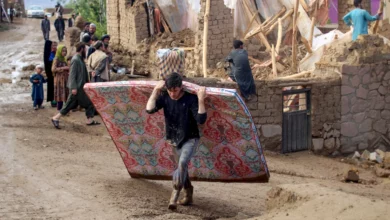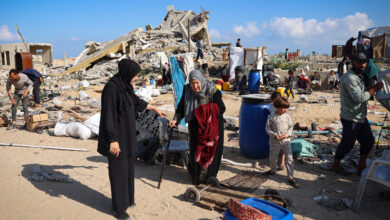I don’t know precisely how many people welcomed ElBaradei at Cairo Airport upon his return to Egypt on Friday, 19 February. When it was time for the Austrian airplane carrying ElBaradei to arrive, there were dozens of people waiting at the airport, but with ElBaradei’s flight running late, the number of people reached several thousand. The crowds that flocked to the airport came from different governorates, and were mostly young people between 18 and 30.
Egyptians of all stars and stripes were present at the airport: activists, artists, novelists, university professors, workers, and farmers. The crowd represented the political and intellectual spectrum from the extreme right to the extreme left.
The fact that such a large number of people assembled to receive ElBaradei, despite suppression from the regime and the dominance of a culture of fear, indisputably sent strong signals that a new dawn might be breaking. The scene at the airport was a source of hope and happiness for those who believe that Egyptian youth have the ability to lead the current political mobilization until it achieves its ultimate aim of bringing about change. But where is all of this leading us? What kind of change does this state of mobility aim to introduce?
It would be hard to give a definite answer to this question at the moment. However, the route this political mobilization will take will be defined by the ability of those mobilized to:
1) Diagnose the weaknesses of the regime and employ them as tools to push for change.
2) Determine where they agree and disagree, and build on common ground to continuously seek to expand agreement.
3) Put in place a preliminary vision of the alternative political and social systems that is representative of the interests and ambitions of those seeking change.
Regarding the nature of the current political system, national powers seem to have reached a consensus on the following:
1) The current regime is corrupt and despotic. There is no hope to reform it and so there is a need for radical change.
2) The current regime is incompetent and incapable of the affairs of the state and of society, especially since it serves the interests of a minority that monopolizes power and wealth.
3) Egypt’s security and social stability is threatened by the current regime staying in power. It also diminishes respect for Egypt in the world, thus threatening the country’s future.
Clearly, the decision-making process–primarily controlled by the president–has been transformed for many reasons, most notably because:
1) The president’s role has diminished due to his age and health problems. He, therefore, spends most of his time at a tourist resort away from the capital. As a result, new players emerged as decision makers.
2) The role played by President Mubarak’s family has expanded, transforming them into a "ruling family," much like the families in royal regimes. Quasi-royal institutions have also appeared on the political scene, although the Constitution states that Egypt is technically a republic.
3) There is a project to transfer power from Hosni Mubarak to his son Gamal. This project has been in progress for years and is about to enter into its final stage.
Since the vast majority of Egyptians believe that a successful transfer of power to Gamal Mubarak would be a blow to what remains of their dignity, they seem to have unanimously agreed to fuel the process of political mobility that started years ago. With parliamentary elections in sight, the state of mobility has further intensified and is expected to reach its climax with the presidential election, scheduled for November 2011.
Increasingly, large segments of Egyptian society have realized that the ruling regime has managed to use political polarization with the Muslim Brotherhood, while at the same time using the Brotherhood to scare people–both in Egypt and abroad–of a Khomeini-like revolution. They have also come to realize that such polarization has resulted in a political vacuum that enables the transfer of power from Mubarak to his son.
It seems quite clear that the ruling party does not want to confront the Brotherhood as much as it wants to hollow out political life. The ruling party does not give other political views a margin of freedom or even a chance to interact with the people in a way that allows any of them to become a "secular" alternative to the current regime.
Since the National Democratic Party (NDP) is determined to transfer power to Gamal Mubarak, it is, therefore, understandable why its behavior is governed by the "it’s-either-us-or-them" logic.
Sadly, some political parties that seemed robust and promising when they first emerged in the mid- and late-1970s have gradually been tamed by the regime. Choosing to be docile, these parties have not only become a part of the regime, but also one of its tools in its project to transfer power.
Those parties could not cross certain red lines drawn by the regime, whereas other powers in Egyptian society started to rebel against the regime’s attempts to win over opposition and to transfer power. As a result, a state of political mobility led by the people has evolved and is led by such movements as Kefaya and 6 April, that reject the passive stance of the current parties. Those movements mushroomed recently, but they have not yet taken an institutional form that could unify them, despite the existence of several common characteristics that could bring them together.
These new movements are the backbone of the crowd that received ElBaradei at the airport, and they were joined by new generations of youth not yet involved in political life but for whom ElBaradei embodies a new hope for change.
I read in the eyes of everyone at the airport that day a desire to find a third alternative, apart from the ruling NDP and the Brotherhood. The NDP is thoroughly corrupt and the Brotherhood is incapable of building a modern society and has been stagnant since its founder Hassan el-Banna died.
At the Cairo Airport, I saw Egypt voting for the third alternative that encompasses all political and intellectual powers, parties and trends that seek to establish a democratic regime based on citizenship, separation of power, transparency, accountability and the rule of law. Such a system would allow all powers to participate, each according to its relative weight–defined by ballot boxes in which people cast their votes in elections which are fully supervised by the judiciary and are characterized by integrity.
All these powers see ElBaradei as the man to lead this transitional stage.
But is ElBaradei aware of the burden that has been placed on his shoulders? Can he carry it?
Only time will tell. Meanwhile, I think we should all help. Are we prepared?
Translated from the Arabic Edition.




